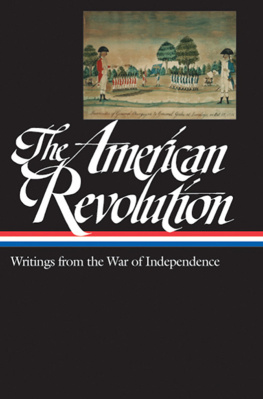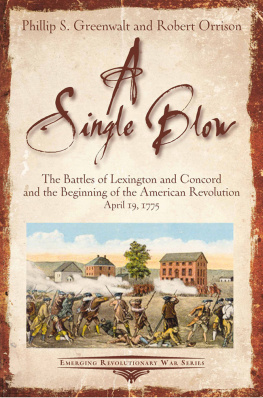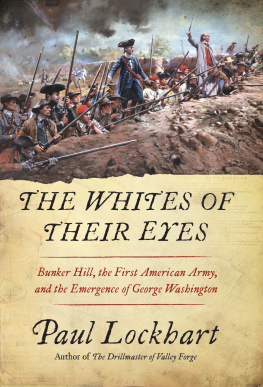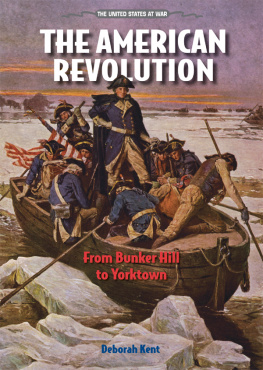
THE AMERICAN
REVOLUTION
Writings from the War of Independence

THE LIBRARY OF AMERICA
Volume compilation, notes, and chronology copyright 2001 by Literary Classics of the United States, Inc., New York, N.Y.
All rights reserved.
No part of this book may be reproduced commercially by offset-lithographic or equivalent copying devices without the permission of the publisher.
Some of the material in this volume is reprinted by permission of the holders of copyright and publication rights.
See Note on the Texts on for acknowledgments.
THE LIBRARY OF AMERICA, a nonprofit publisher, is dedicated to publishing, and keeping in print, authoritative editions of America's best and most significant writing. Each year the Library adds new volumes to its collection of essential works by America's foremost novelists, poets, essayists, journalists, and statesmen.
If you would like to request a free catalog and find out more about The Library of America, please visit with your name and address. Include your e-mail address if you would like to receive our occasional newsletter with items of interest to readers of classic American literature and exclusive interviews with Library of America authors and editors (we will never share your e-mail address).
Library of Congress Catalog Number: 00045373.
Print ISBN 1883011914
First eBook Edition: Septempber 2012
eISBN 978-1-59853-139-8
JOHN RHODEHAMEL
SELECTED THE CONTENTS AND WROTE THE NOTES
FOR THIS VOLUME
THE WAR BEGINS: MASSACHUSETTS, APRIL 1775
Paul Revere: Memorandum on Events of April 18, 1775
P AUL REVERE of Boston, in the Colony of Massachusetts Bay in New England; of Lawfull Age, doth testify and say, that I was sent for by Docr Joseph Warren, of said Boston, on the evening of the 18th of April, about 10 oClock; when he desired me to go to Lexington, and inform Mr Samuel Adams, and the Honle John Hancock Esqr that there was a number of Soldiers, composed of Light troops, & Grenadiers, marching to the bottom of the Common, where was a number of Boats to receive them; it was supposed, that they were going to Lexington, by the way of Cambridge River, to take them or go to Concord, to distroy the Colony Stores. I proceeded immeditely, and was put across Charles River, and landed near Charlestown Battery, went in town, and there got a Horse. while in Charlestown, I was informed by Richd Devens Esqr that he mett that evening, after Sun sett, Nine Officers of the Ministeral Army, mounted on good Horses, & Armed, going towards Concord; I set off, it was then about 11 oClock, the Moon shone bright. I had got almost over Charlestown Common, towards Cambridge, when I saw two Officers on Horseback, standing under the shade of a Tree, in a narrow part of the roade. I was near enough to see their Holsters, & cockades. One of them Started his horse towards me, the other up the road, as I supposed, to head me should I escape the first. I turned my horse short about, and rid upon a full Gallop for Mistick Road, he followed me about 300 yardes, and finding he could not catch me, returned. I proceeded to Lexington, thro Mistick, and alarmed Mr Adams & Col. Hancock. After I had been there about half an hour Mr Daws arrived, who came from Boston, over the neck; we set off for Concord, & were overtaken by a young Gentn named Prescot, who belonged to Concord, & was going home; when we had got about half way from Lexington to Concord, the other two, stopped at a House to awake the man, I kept along. When I had got about 200 Yards ahead of them, I saw two officers as before. I called to my company to come up, saying here was two of them, (for I had told them what Mr Devens told me, and of my being stoped) in an instant, I saw four of them, who rode up to me, with their pistols in their hands, said Gd dn you stop, if you go an Inch further, you are a dead Man. immeditly Mr. Prescot came up we attempted to git thro them, but they kept before us, and swore if we did not turn in to that pasture, they would blow our brains out, (they had placed themselves opposite to a pair of Barrs, and had taken the Barrs down) they forced us in, when we had got in, Mr Prescot said put on. He took to the left, I to the right, towards a Wood, at the bottom of the Pasture, intending, when I gained that, to jump my Horse & run afoot; just as I reached it, out started six officers, siesed my bridle, put their pistols to my Breast, ordered me to dismount, which I did. One of them, who appeared to have the command there, and much of a Gentleman, asked me where I came from; I told him, he asked what time I left it; I told him, he seemed surprised, said Sr, may I crave your name. I answered my name is Revere, what said he, Paul Revere; I answered yes; the others abused me much; but he told me not to be afraid, no one should hurt me. I told him they would miss their Aim. He said they should not, they were only waiting for some Deserters they expected down the Road. I told him I knew better, I knew what they were after; that I had alarmed the country all the way up, that their Boats were catchd aground, and I should have 500 men there soon; one of them said they had 1500 coming; he seemed surprised and rode off into the road, and informed them who took me, they came down immeditly on a full gallop, one of them (whom I since learned, was Major Mitchel of the 5th Regt) clapd his Pistol to my head, and said he was going to ask me some questions, if I did not tell the truth, he would blow my brains out. I told him I esteemed myself a man of truth, that he had stopped me on the highway, & made me a prisoner, I knew not by what right; I would tell him the truth; I was not afraid. He then asked me the same questions that the other did, and many more, but was more particular; I gave him much the same answers; he then ordered me to mount my horse, they first searched me for pistols. When I was mounted, the Major took the reins out of my hand, and said, by Gd Sr, you are not to ride with reins I assure you; and gave them to an officer on my right to lead me. he then Ordered 4 men out of the Bushes, and to mount their horses; they were country men which they had stopped who were going home; then ordered us to march. He said to me We are now going towards your friends, and if you attempt to run, or we are insulted, we will blow your Brains out. When we had got into the road they formed a circle and ordered the prisoners in the centre & to lead me in the front.
We rid towards Lexington, a quick pace; they very often insulted me calling me Rebel, &c &c. after we had got about a mile, I was given to the Sergant to lead, he was Ordered to take out his pistol (he rode with a hanger) and if I run, to execute the Majors sentence; When we got within about half a Mile of the Meeting house, we heard a gun fired; the Major asked me what it was for, I told him to alarm the country; he Ordered the four prisoners to dismount, they did, then one of the officers dismounted and cutt the Bridles, and Saddels, off the Horses, & drove them away, and told the men they might go about their business; I asked the Major to dismiss me, he said he would carry me, lett the consequence be what it will; He then Orderd us to march; when we got within sight of the Meeting House, we heard a Volley of guns fired, as I supposed at the tavern, as an Alarm; the Major ordered us to halt. he asked me how far it was to Cambridge, and many more questions, which I answered; he then asked the Sergant, if his horse was tired, he said yes; he Ordered him to take my horse; I dismounted, the Sarjant mounted my horse; they cutt the Bridle & saddle off the Sarjants horse & rode off down the road. I then went to the house where I left Mess Adams & Hancock, and told them what had happined; their friends advised them to go out of the way: I went with them, about two miles a cross road; after resting myself, I sett off with another man to go back to the Tavern, to enquire the News; when we got there, we were told the troops were within two miles. We went into the Tavern to git a Trunk of papers belonging to Col. Hancock, before we left the House, I saw the Ministeral Troops from the Chamber window. We made haste & had to pass thro our Militia, who were on a green behind the Meeting house, to the number as I supposed, about 50 or 60. I went thro them; as I passed I heard the commanding officer speake to his men to this purpose. Lett the troops pass by, & dont molest them, without they begin first I had to go a cross Road, but had not got half Gun shot off when the Ministeral Troops appeared in sight behinde the Meeting House; they made a short halt, when a gun was fired. I heard the report, turned my head, and saw the smoake in front of the Troops, they imeaditly gave a great shout, ran a few paces, and then the whole fired. I could first distinguish Iregular fireing, which I suppose was the advance Guard, and then platoons. At the time I could not see our Militia, for they were covered from me, by a house at the bottom of the Street. and further saith not.
Next page






